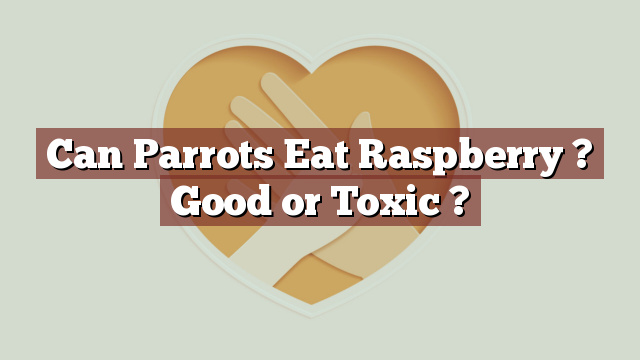Can Parrots Eat Raspberry? Good or Toxic?
It is important for bird owners to have a good understanding of which foods are safe and beneficial for their pets. Parrots, known for their vibrant feathers and playful personalities, require a nutritious diet to thrive. While they primarily feed on seeds, fruits and vegetables are also a crucial part of their balanced diet. One fruit that often piques the curiosity of parrot owners is the raspberry. In this article, we will explore the nutritional value of raspberries and evaluate whether parrots can safely consume them.
Nutritional Value of Raspberry: Vitamins, Fiber, and Antioxidants
Raspberries are a popular fruit due to their sweet-tart taste and vibrant color. They are rich in essential vitamins and minerals, making them a valuable addition to a parrot’s diet. Raspberries are an excellent source of vitamin C, which supports the immune system and promotes overall health. Additionally, they contain vitamin K, which aids in blood clotting, and vitamin E, which acts as an antioxidant. Raspberries are also packed with dietary fiber, aiding in digestion, and antioxidants that help protect against cell damage.
Can Parrots Eat Raspberry? Benefits Outweigh Potential Risks
Yes, parrots can eat raspberries. In fact, feeding them this delicious fruit can provide several health benefits. The nutritional profile of raspberries aligns with the dietary needs of parrots, making them a suitable addition to their regular diet. The vitamins, fiber, and antioxidants found in raspberries can contribute to the overall well-being of the bird.
Potential Risks: High Sugar Content and Pesticide Residue
While raspberries offer numerous health benefits, there are a few potential risks associated with feeding them to parrots. The high sugar content in raspberries can be a concern if consumed in excess. Parrots should only be given raspberries as a treat and not as a staple food. Additionally, it is important to choose organic raspberries whenever possible to minimize exposure to pesticide residue, which can be harmful to birds.
If Your Parrot Eats Raspberry: Monitor for Digestive Issues
If your parrot consumes raspberries, it is essential to monitor their digestive health. Some birds may experience loose stools or an upset stomach if they consume too much fruit. If any digestive issues persist or worsen, it is advisable to consult a veterinarian for guidance.
Conclusion: Raspberry Can Be Given in Moderation for Added Nutrition
In conclusion, raspberries can be a beneficial addition to a parrot’s diet when given in moderation. Their nutritional value, including vitamins, fiber, and antioxidants, can contribute to a parrot’s overall health. However, it is crucial to note that raspberries should only be provided as an occasional treat due to their high sugar content. Additionally, selecting organic raspberries can help minimize potential exposure to harmful pesticides. As responsible parrot owners, it is essential to monitor our feathered friends for any adverse reactions and consult a veterinarian if any concerns arise. By providing a varied and balanced diet, we can ensure the well-being and vitality of our beloved parrots.
Thank you for investing your time in exploring [page_title] on Can-Eat.org. Our goal is to provide readers like you with thorough and reliable information about various dietary topics. Each article, including [page_title], stems from diligent research and a passion for understanding the nuances of our food choices. We believe that knowledge is a vital step towards making informed and healthy decisions. However, while "[page_title]" sheds light on its specific topic, it's crucial to remember that everyone's body reacts differently to foods and dietary changes. What might be beneficial for one person could have different effects on another. Before you consider integrating suggestions or insights from "[page_title]" into your diet, it's always wise to consult with a nutritionist or healthcare professional. Their specialized knowledge ensures that you're making choices best suited to your individual health needs. As you navigate [page_title], be mindful of potential allergies, intolerances, or unique dietary requirements you may have. No singular article can capture the vast diversity of human health, and individualized guidance is invaluable. The content provided in [page_title] serves as a general guide. It is not, by any means, a substitute for personalized medical or nutritional advice. Your health should always be the top priority, and professional guidance is the best path forward. In your journey towards a balanced and nutritious lifestyle, we hope that [page_title] serves as a helpful stepping stone. Remember, informed decisions lead to healthier outcomes. Thank you for trusting Can-Eat.org. Continue exploring, learning, and prioritizing your health. Cheers to a well-informed and healthier future!

